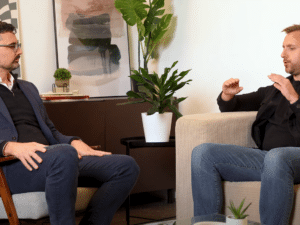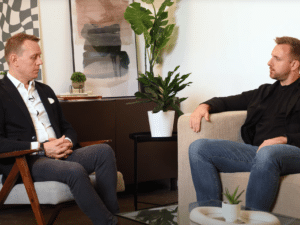What is a Chief People Officer?

Many different roles have emerged within the HR space in the last several decades, and it can sometimes be unclear how these various positions fit into the wider constellation of the HR department.
One of these emergent roles, Chief People Officer (CPO), has created some confusion within the modern workforce.
This new role has emerged to reflect a greater focus on employee wellbeing, culture, equity and diversity, promoting a new approach to employees beyond the scope of the traditional Chief Human Resources Officer role.
This article tackles some of the burning questions surrounding this new role, including:
- What is a Chief People Officer?
- What does the role entail?
- What are the challenges the CPO faces?
- And perhaps most importantly: how does it actually differ from the more familiar Chief Human Resources Officer (CHRO) role?
Defining the role
A Chief People Officer typically replaces the position of Chief Human Resources Officer on a company’s executive C-suite.
But rather than simply a like-for-like switch, the emergence of the Chief People Officer reflects a new focus on company culture, inclusion, employee experience, equity and diversity.
The key roles of a CPO include:
- Developing and implementing a human resources strategy
- Leading cultural change at an organisational level
- Creating and promoting opportunities for professional development
- Overseeing benefits programmes
- Utilising modern strategies to improve HR policy
- Creating a company culture based on fairness and equity
- Promoting company values
- Ensuring employee wellbeing
CPOs focus on fostering opportunities for professional growth and promoting strong, ethical, balanced leadership.
It reflects a need to focus on the needs of individual employees, rather than an approach based on a one-size-fits-all company HR plan.
It may also make greater use of data analytics to craft a more individualised approach towards employee recruitment and retention, tailoring it towards and increasingly international, hybrid and conscious workforce.
Ultimately the role of the CPO Is about creating a more dynamic environment that allows firms to better meet the changing needs of the modern office.
A CPO, therefore, requires a particular set of skills learned over a long career, including:
- Leadership – the ability to take charge of the direction of the HR team
- Organisation – managing different employees and stakeholders
- Communication – to ensure the company is aligned around HR policy
- Data analysis – to make smart, informed decisions about people and policy
- Talent management – to direct the hiring and retention of the best people
This skillset reflects an evolution in the role towards communication, empathy, and thoughtful leadership. No longer is the CPO a rather distant part of an organisation, but a key player in company culture and employee wellbeing.
What’s the difference between a CPO and CHRO?
Confusion arises when comparing the CPO to a Chief Human Resources Officer. These two positions have similar, sometimes overlapping briefs – indeed, some companies may simply use them interchangeably – but in certain respects they play distinct roles within an HR department.
However, the difference between the two roles is as much about ethos and culture than any of the key responsibilities. Both will take charge of company HR policy, but the CPO is an evolution of the CHRO role to align better with modern corporate values.
The role of the CPO goes beyond implementing policy and managing recruitment, gaining a greater responsibility for the development and fostering of a strong company culture.
The CPO must make a company more adaptive and reactive to the changing requirements of the modern business, utilising data analytics to make smarter decisions about employee recruitment and retention.
Furthermore, there is a growing appreciation of – if not a requirement to – promote diversity and inclusion within a business, and the CPO must be at the heart of that operation.
Ultimately, as businesses come to understand that the human resources department is not simply a tool for implementing HR policy, the CPO will continue to take on a more central role, perhaps superseding the old, more limited CHRO role entirely.
What’s the importance of the role?
The CPO is fast becoming an essential cog in the HR machine.
The old cliche tells us a business is nothing without its people, and the Chief People Officer allows companies to take a more focused, proactive approach to culture, compensation, work-life balance, benefits and employee wellbeing.
As mentioned above, it’s also a statement of intent for a company’s HR direction, that it will take a firmly people-orientated approach to its employee strategy.
Consequently, the CPO can play an important role in formulating HR policies that comply now only with legal requirements, but also with that new ethos in mind. They will be in charge not just of communicating and enforcing those policies, but also the people-centric values the company has adopted.
A successful CPO will promote strategic alignment across the company, helping to meet company objectives and legal demands.
What are the challenges of the role?
The shift towards the CPO also reflects a changing set of challenges facing modern businesses.
Since the Covid-19 pandemic, workplace dynamics have been changing rapidly, and many firms are still trying to reach an equilibrium between remote, hybrid and on-site working. As demand for flexible working policies, particularly, for example, for parents, becomes entrenched, CPOs must strike a balance between employee and company demands.
They must also manage a recruitment process in which there are now hundreds of potential applicants for each role, while navigating changing rules surrounding diversity within the hiring process.
The emergence of AI and data analytics may have made such things easier more sophisticated, but it also places greater demands on the CPO to effectively utilise them.
In attempting to change a company’s approach to HR, the CPO may face institutional sclerosis, inconsistent existing policies and outdated HR software.
An effective CPO will be able to balance the demands of the modern workplace, the needs of a business, and the expectations of employees increasingly demanding a better work-life balance and a more caring employer.
If you would like to discuss talent acquisition in greater detail, get in touch with a member of the team.


